
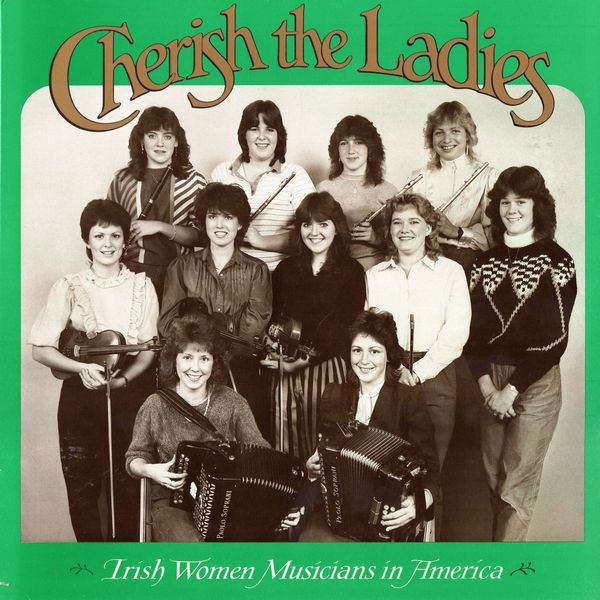 |
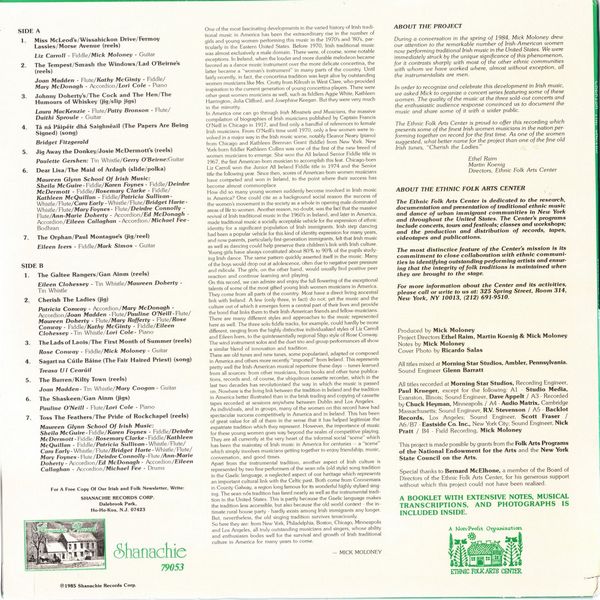
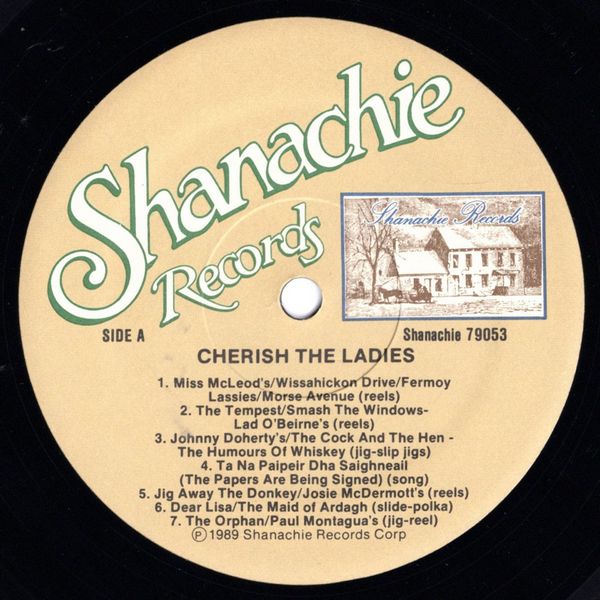
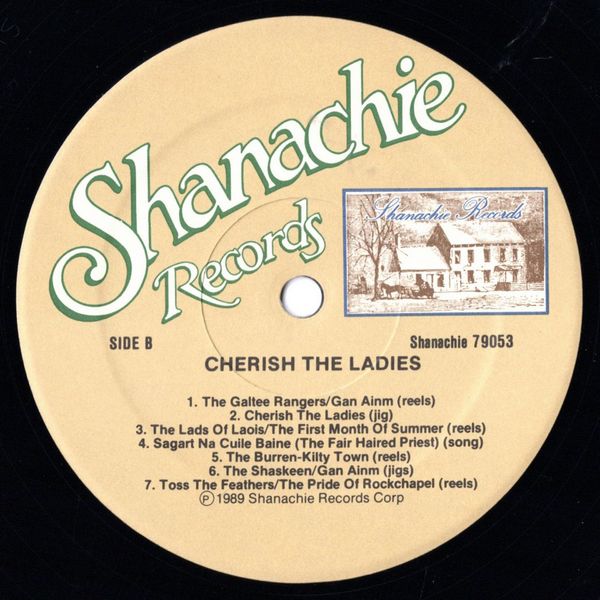
|
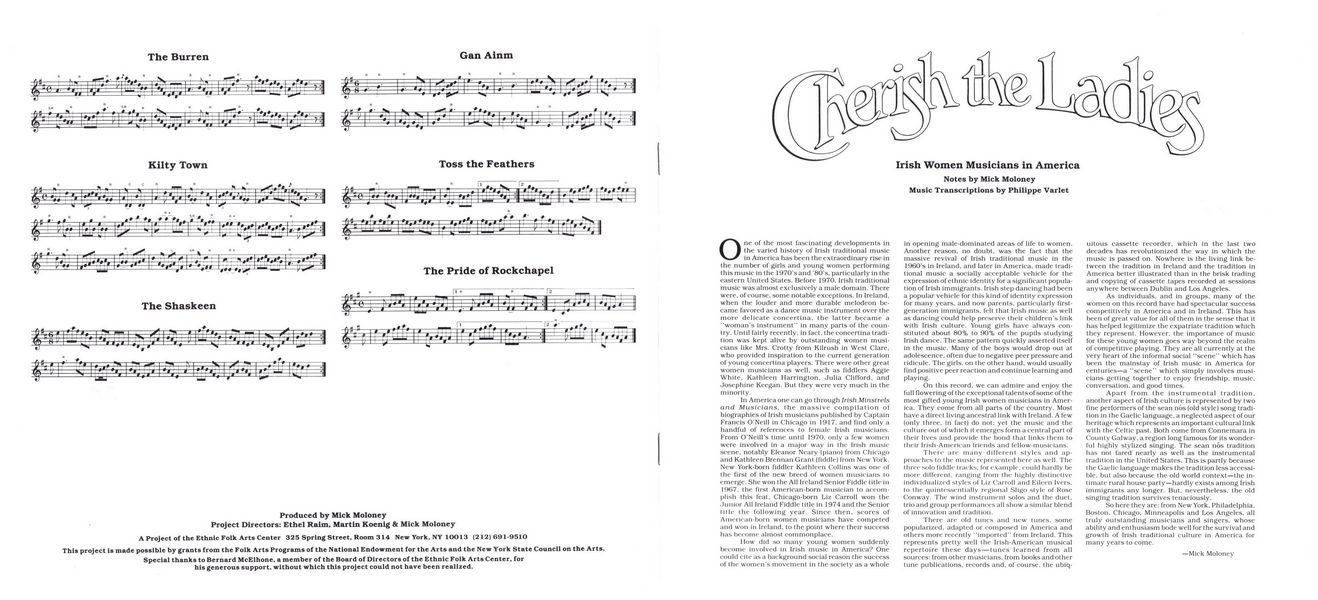 |
| more images |
Sleeve Notes
One of the most fascinating developments in the varied history of Irish traditional music in America has been the extraordinary rise in the number of girls and young women performing this music in the 1970's and '80's, particularly in the Eastern United States. Before 1970, Irish traditional music was almost exclusively a male domain. There were, of course, some notable exceptions. In Ireland, when the louder and more durable melodeon became favored as a dance music instrument over the more delicate concertina, the latter became a "woman's instrument" in many parts of the country. Until fairly recently, in fact, the concertina tradition was kept alive by outstanding women musicians like Mrs. Crotty from Kilrush in West Clare, who provided inspiration to the current generation of young concertina players. There were other great women musicians as well, such as fiddlers Aggie White, Kathleen Harrington, Julia Clifford, and Josephine Keegan. But they were very much in the minority.
In America one can go through Irish Minstrels and Musicians, the massive compilation of biographies of Irish musicians published by Captain Francis O'Neill in Chicago in 1917, and find only a handful of references to female Irish musicians. From O'Neill's time until 1970, only a few women were involved in a major way in the Irish music scene, notably Eleanor Neary (piano) from Chicago and Kathleen Brennan Grant (fiddle) from New York. New York-born fiddler Kathleen Collins was one of the first of the new breed of women musicians to emerge. She won the All Ireland Senior Fiddle title in 1967, the first American-born musician to accomplish this feat. Chicago-born Liz Carroll won the Junior All Ireland Fiddle title in 1974 and the Senior title the following year. Since then, scores of American-born women musicians have competed and won in Ireland, to the point where their success has become almost commonplace.
How did so many young women suddenly become involved in Irish music in America? One could cite as a background social reason the success of the women's movement in the society as a whole in opening male-dominated areas of life to women. Another reason, no doubt, was the fact that the massive revival of Irish traditional music in the 1960's in Ireland, and later in America, made traditional music a socially acceptable vehicle for the expression of ethnic identity for a significant population of Irish immigrants. Irish step dancing had been a popular vehicle for this kind of identity expression for many years, and now parents, particularly first-generation immigrants, felt that Irish music as well as dancing could help preserve their childrens link with Irish culture. Young girls have always constituted about 80% to 90% of the pupils studying Irish dance. The same pattern quickly asserted itself in the music. Many of the boys would drop out at adolescence, often due to negative peer pressure and ridicule. The girls, on the other hand, would usually find positive peer reaction and continue learning and playing.
On this record, we can admire and enjoy the full flowering of the exceptional talents of some of the most gifted young Irish women musicians in America. They come from all parts of the country. Most have a direct living ancestral link with Ireland. A few (only three, in fact) do not; yet the music and the culture out of which it emerges form a central part of their lives and provide the bond that links them to their Irish-American friends and fellow-musicians. There are many different styles and approaches to the music represented here as well. The three solo fiddle tracks, for example, could hardly be more different, ranging from the highly distinctive individualized styles of Liz Carroll and Eileen Ivers, to the quintessentially regional Sligo style of Rose Conway. The wind instrument solos and the duet trio and group performances all show a similar blend of innovation and tradition.
There are old tunes and new tunes, some popularized, adapted or composed in America and others more recently "imported" from Ireland. This represents pretty well the Irish-American musical repertoire these days — tunes learned from all sources: from other musicians, from books and other tune publications, records and, of course, the ubiquitous cassette recorder, which in the last two decades has revolutionized the way in which the music is passed on. Nowhere is the living link between the tradition in Ireland and the tradition in America better illustrated than in the brisk trading and copying of cassette tapes recorded at sessions anywhere between Dublin and Los Angeles.
As individuals, and in groups, many of the women on this record have had spectacular success competitively in America and in Ireland. This has been of great value for all of them in the sense that it has helped legitimize the expatriate tradition which they represent. However, the importance of music for these young women goes way beyond the realm of competitive playing. They are all currently at the very heart of the informal social "scene" which has been the mainstay of Irish music in America for centuries — a "scene" which simply involves musicians getting together to enjoy friendship, music, conversation, and good times.
Apart from the instrumental tradition, another aspect of Irish culture is represented by two fine performers of the Sean-nós (old style) song tradition in the Gaelic language, a neglected aspect of our heritage which represents an important cultural link with the Celtic past. Both come from Connemara in County Galway, a region long famous for its wonderful highly stylized singing. The Seán nós tradition has fared nearly as well as the instrumental tradition in the United States. This is partly because the Gaelic language makes the tradition less accessible, but also because the old world context — the intimate rural house party — hardly exists among Irish immigrants any longer. But, nevertheless, the old singing tradition survives tenaciously.
So here they are: from New York, Philadelphia, Boston, Chicago, Minneapolis and Los Angeles, all truly outstanding musicians and singers, whose ability and enthusiasm bodes well for the survival and growth of Irish traditional culture in America for many years to come.
Mick Moloney
About The Project
During a conversation in the spring of 1984, Mick Moloney drew our attention to the remarkable number of Irish-American women now performing traditional Irish music in the United States. We were immediately struck by the unique significance of this phenomenon, for it contrasts sharply with most of the other ethnic communities with whom we have worked where, almost without exception, all the instrumentalists are men.
In order to recognize and celebrate this development in Irish music, we asked Mick to organize a concert series featuring some of these women. The quality of the music at the three sold-out concerts and the enthusiastic audience response convinced us to document the music and share some of it with a wider public.
The Ethnic Folk Arts Center is proud to offer this recording which presents some of the finest Irish women musicians in the nation performing together on record for the first time. As one of the women suggested, what better name for the project than one of the fine old Irish tunes, "Cherish the Ladies."
Ethel Raim & Martin Koenig
Directors, Ethnic Folk Arts Center